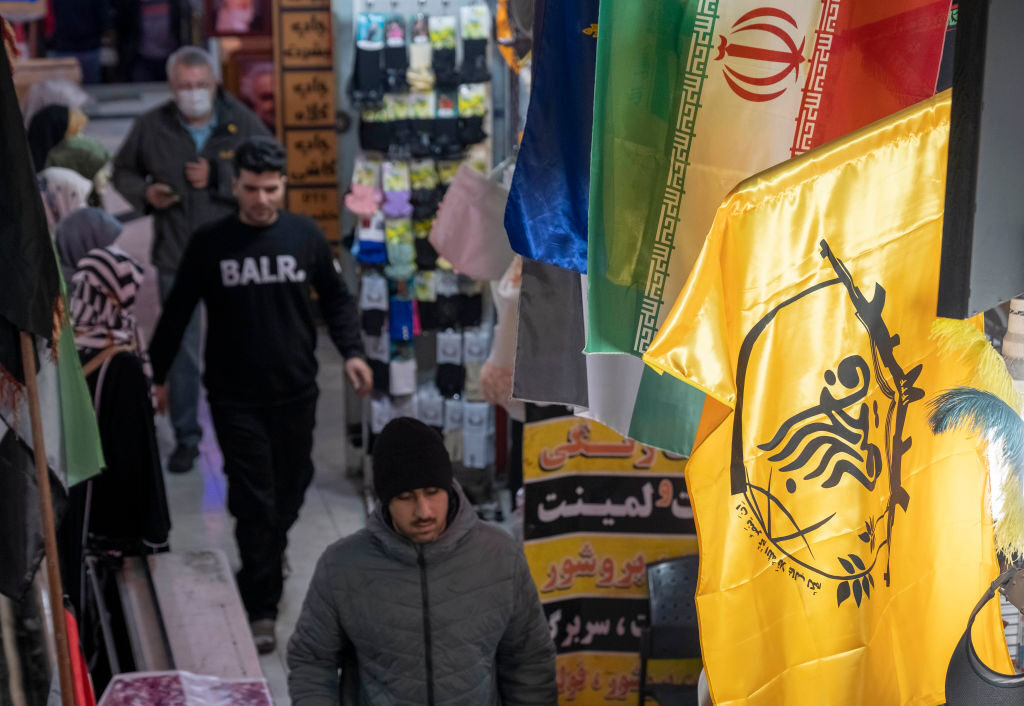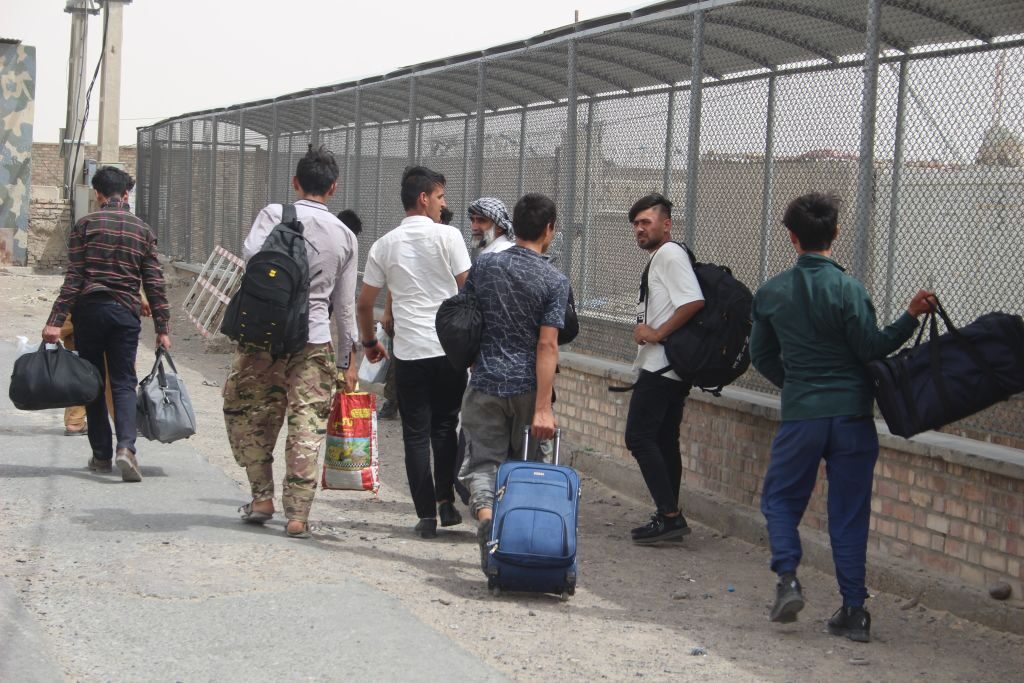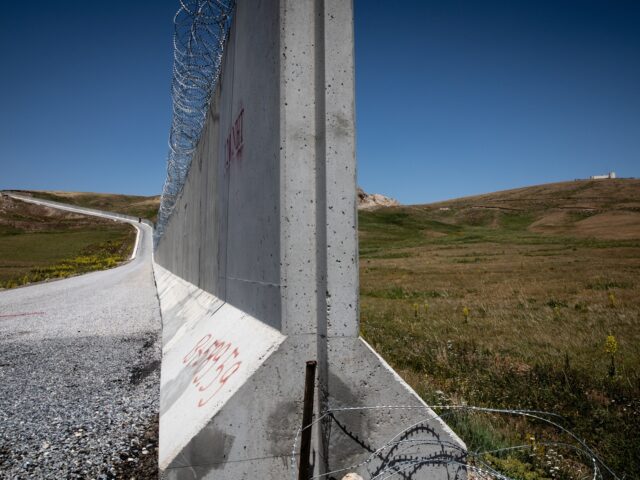Iran’s top diplomat on Afghanistan issues reportedly claimed in an interview on Wednesday his country is studying the best way to construct a border wall to protect itself from terror threats emanating from its eastern neighbor.
Iran has supported the Taliban, the terrorist organization that governs Afghanistan unopposed, geopolitically since its ascent to power in August 2021 – the result of leftist President Joe Biden extending the 20-year Afghan War with seemingly no coherent plan for withdrawal. Iran recognizes the Taliban as an “interim” government, one of the few countries to do so, and has repeatedly condemned the United States for its anti-terrorist operations in Afghanistan.
The bilateral relationship with the Taliban has been much more challenging for Tehran. The two countries share a border along the Helmand River. Iran has repeatedly accused the Taliban of using a dam on Afghan territory to block the flow of the river and deprive Iranians of critical water access. The Taliban insists that it has not done so and any water shortages are the result of droughts that affect both countries.
The dispute erupted in violence last year as border guards shot at each other. A senior Taliban commander threatened to “conquer” Iran in May.
The Afghan news site Khaama Press translated the remarks by Special Representative for Afghanistan Kazemi Qomi to the Iranian Students’ News Agency (ISNA) in which he claimed the border plan was “essential for national sovereignty” in light of mounting issues with the Taliban government across the border.

Iranian men walk past an Iranian flag and a flag of Afghanistan’s Fatemiyoun division at a war toys and religious accessory shopping mall in downtown Tehran, on the anniversary of the killing of Qassem Soleimani at Baghdad Airport by the United States, on December 30, 2023. (Morteza Nikoubazl/NurPhoto via Getty Images)
“Considering that the enemies of the people are seeking to strike us in various ways, including through the mobilization of proxy terrorist forces,” Qomi reportedly said, “we are not necessarily confronted with the demarcated borders of the two countries but with various terrorist elements at the border, which are supported by major powers that currently use both soft and hard power simultaneously to strike at us.”
“Therefore, we must take our border security and control more seriously,” Qomi concluded.
He described the border plan the Iranian government is considering as a “concrete wall.”
Khaama Press further noted that Qomi claimed Iran “has been working on this directive (border blockade) for years and initial designs” exist.
Iranian Interior Minister Ahmad Vahidi denied that the country was considering building a wall along its border with Afghanistan less than a month ago.
“There is no plan to build a wall,” Vahidi said plainly on February 7. “The issue of blocking the border is what we are pursuing.”
Qomi reportedly stated that Iran would execute the plan of “blocking the border” by building a wall.
ISNA has not published an English-language translation of the interview with Qomi at press time, but the Persian-language text is available online.
“On the issue of the physical blockage of the country’s border with Afghanistan,” the text read, “he said a study is underway on how to physically block the border. This blockage is supposed to be in the form of a concrete wall and is one of the great things that need to be done.”
The diplomat said that the Taliban was cooperating and engaging in “intimate” talks with the Iranian government on sharing water, “security, terrorism, economic and trade cooperation, [and] the fight against drugs,” among other issues.

Afghan refugees are seen at a border crossing point in Nimroz Province, Afghanistan, June 26, 2023. More than 74,000 Afghan refugees have returned to their homeland Afghanistan from neighboring Iran over the past month, the state-run Bakhtar news agency reported on Monday. (Azizi/Xinhua via Getty)
Qomi reportedly said that the border wall was necessary not just for “preventing illegal immigrants from entering and combatting human trafficking, drugs, etc.,” but because “enemies of the Islamic ummah [community] are seeking to hit [Iran] in various ways, including by mobilizing terrorist proxies.”
The Iranian government has expressed particular concern about the Islamic State – which it falsely claims is a “Zionist” American proxy terrorist organization – and terrorist groups belonging to the Baloch ethnic minority present in Iran and Pakistan. Iran suffered one of its most devastating recent terrorist attacks in January – a suicide bombing that killed dozens of people at a memorial service for slain Islamic Revolutionary Guard Corps (IRGC) terrorist mastermind Qassem Soleimani – at the hands of the Islamic State.
Terrorism in Sistan and Baluchestan, the province bordering Pakistan, has also become an elevated concern after multiple attacks in the region. Iranian authorities identified another such attempted attack on Wednesday that failed, as the terrorists orchestrating it accidentally detonated his roadside bomb prematurely, killing one of the two involved. Iranian police have not at press time accused the suspects of belonging to any known terrorist organization.
The Baloch terrorism issue escalated to a violent confrontation with nuclear-powered Pakistan in January, when Iranian military authorities conducted airstrikes within Pakistani territory, violating the sovereignty of that country and infuriating its government. Pakistan accused the Iranian military of killing two children and injuring three others in the “counterterrorism” operation.
“This violation of Pakistan’s sovereignty is completely unacceptable and can have serious consequences,” Islamabad protested in a public statement.
Two days later, the Pakistani military engaged in similar airstrikes in Iran, which Iran protested nearly identically.
The Taliban responded to its neighbors bombing each other by expressing “alarm” and insisting that the “two neighboring countries … exercise restraint.”
Follow Frances Martel on Facebook and Twitter.

COMMENTS
Please let us know if you're having issues with commenting.